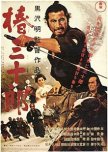Subtle parody of 'Samurai' films
Sanjuro is considered a sequel to 'Yojimbo', but their storylines are independent. The titular character Sanjuro, we presume, is the same in both. This is a great film, but it is strongly recommended to watch Yojimbo first. The experience of watching Sanjuro is also enhanced if one has watched many of the more 'serious' classic samurai films including ones by Akira Kurosawa. Sanjuro, both the character and film, take us on a comedic journey of the world of lord, lady, gentleman warrior, and an outcast savant warrior.
Compared to Yojimbo, Sanjuro's plot is less developed and achieved more quickly in pace and runtime. The main feast of the film is in the characters, mainly Sanjuro and the contrasting group of 9 men he, by serendipity, 'mentors' from the path of foolish death. To win in a socially ordered world of the samurai, one must think obliquely, act unruly even, to accomplish one's aims. The chamberlain, Mutsuta, the one with a long horse face, is another one of these people on the fringe of social acceptance, but is very clever in achieving aims through subtle strategy, and not the chivalrous wave a sword around methods. It seems Kurosawa is poking fun at socially ordered rules and brotherhoods.
Many of the role characters are terrific. The prisoner 'spy' adds much to the comedic presence of the main ensemble. The chamberlain's wife is full of witty dialogue and regard for this 'interesting' Sanjuro. The henchmen play their roles quite well. The plot exists, it seems, for Kurosawa to display the nuances and parodies of these familiar character types.
The music in the film is strong and includes some of the familiar music of Yojimbo. There is a heroic fanfare that is clearly a theme of parody/comedy. It's easily recognized.
This film is a treat for the veteran Kurosawa and/or classic Japanese cinema viewers.
Compared to Yojimbo, Sanjuro's plot is less developed and achieved more quickly in pace and runtime. The main feast of the film is in the characters, mainly Sanjuro and the contrasting group of 9 men he, by serendipity, 'mentors' from the path of foolish death. To win in a socially ordered world of the samurai, one must think obliquely, act unruly even, to accomplish one's aims. The chamberlain, Mutsuta, the one with a long horse face, is another one of these people on the fringe of social acceptance, but is very clever in achieving aims through subtle strategy, and not the chivalrous wave a sword around methods. It seems Kurosawa is poking fun at socially ordered rules and brotherhoods.
Many of the role characters are terrific. The prisoner 'spy' adds much to the comedic presence of the main ensemble. The chamberlain's wife is full of witty dialogue and regard for this 'interesting' Sanjuro. The henchmen play their roles quite well. The plot exists, it seems, for Kurosawa to display the nuances and parodies of these familiar character types.
The music in the film is strong and includes some of the familiar music of Yojimbo. There is a heroic fanfare that is clearly a theme of parody/comedy. It's easily recognized.
This film is a treat for the veteran Kurosawa and/or classic Japanese cinema viewers.
Cet avis était-il utile?







